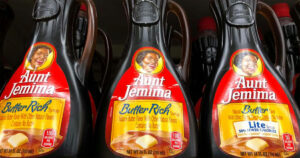“Aunt Jemima’s” great-grandson angry that her legacy is being scrapped: “It’s injustice to my family” FULL STORY in first comment👇👇
When Quaker Oats announced the discontinuation of their “Aunt Jemima” brand in 2020 in response to the Black Lives Matter movement, it stirred significant controversy.
Nevertheless, just one day after the decision became public, a great-grandson of “Aunt Jemima” voiced his objection, arguing that the move risked erasing black history and the struggles endured by African Americans.
“This situation is deeply unjust for both me and my family. This is an integral part of our history,” expressed Larnell Evans Sr., a Marine Corps veteran. He asserted that the company, which had profited from slavery for many years, was now being charged with attempting to abolish it, according to his perspective.
“The racism they refer to, exploiting imagery from slavery, originates from the other side — the white community. This company benefits from the portrayal of our enslavement. And their solution is to erase the history of my great-grandmother, a black woman. It’s profoundly painful.”







